Big man, big expectations
Updated: 2016-06-25 00:57
By Alywin Chew in Shanghai(China Daily USA)
|
||||||||
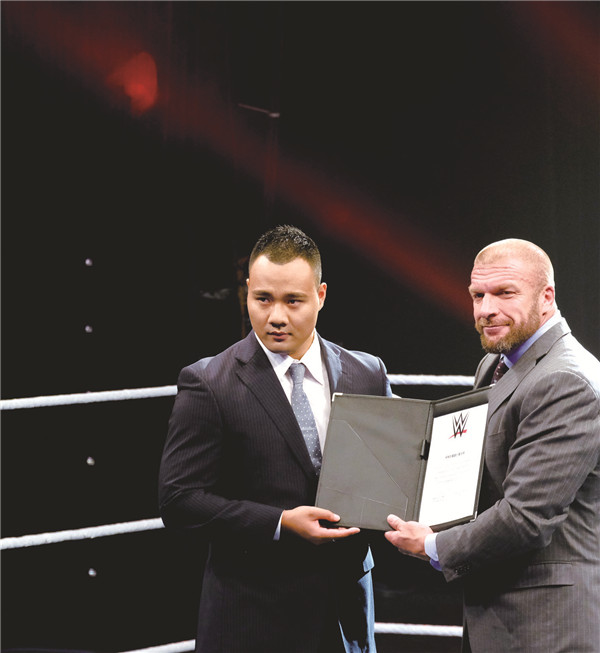 |
|
Wang Bin (left) poses for a photo with WWE legend Triple H after signing a contract. The Anhui native is seen as the key to winning Chinese audiences for the WWE and the local wrestling scene. |
China's professional wrestling scene
Wang isn't wrong in saying so. Apart from Japan, the pro wrestling scene across Asia can still be considered to be in a nascent stage.
Japanese pro wrestling, also known as puroresu, is widely believed to have started in the early 1950s when a sumo wrestler named Rikidozan started the Japan Pro Wrestling Alliance.
In contrast, this form of sports entertainment has a history of slightly more than a decade in China, consisting of just a handful of independent outfits.
Guangdong-based China Wrestling Entertainment (CWE) is widely considered the pioneer of the pro wrestling scene in the country. Set up in 2004, the company is run by Liu Xuanzheng, also known as "The Slam", who has experience wrestling in South Korea.
Despite being an industry veteran, The Slam's real name doesn't actually show up in Google, the world's most used search engine, and could perhaps be seen as an indication of how China's pro wrestling scene is still isolated from the rest of the world.
Another company is Harbin-based Middle Kingdom Wrestling (MKW). Founded by an American named Adrian Gomez, MKW has been making brisk progress in China following its inception last year, having held three wrestling events across the country.
Gomez, who plans the storyline and writes the scripts for the shows, is aiming to establish a distinctively Chinese style of wrestling entertainment within five years. MKW has also established ties with pro wrestling outfits across the region, regularly booking foreign wrestlers to come perform in China.
Kenneth Thexeira, a 27-year-old Eurasian of Portuguese-Chinese parentage, wrestled in Dongguan in Guangdong province earlier this year in January thanks to MKW.
"I admire the vision and ambition of MKW, which is home to interesting characters and good wrestlers…they also tape episodes for a seasonal web series, which is gaining traction in China and around the world," said the Singaporean wrestler, who goes by the nickname "Eurasian Dragon".
Another wrestler that MKW had brought over to China was Hong Kong's Ho Ho Lun. The 28-year-old, who took part in the WWE try-outs last week, made the headlines earlier this year when he was selected to take part in the inaugural WWE Cruiserweight Series. This competition, which features 32 up-and-coming wrestlers from around the world, is a potential springboard for him to get a foot into the WWE.
Ho, the founder of the Hong Kong Pro-Wrestling Federation, said that one of the main impediments to pro wrestling's growth across Asia is the lack of a steady supply of wrestlers. And this is not because nobody aspires to become one but rather, most people quit after discovering how tough the training is.
"I know of a lot of people who dream of becoming pro wrestlers, but after undergoing the training they realize that it is too painful a process. I think only one out of 100 trainees have the determination to train until they make their debut in the ring," said Ho.
In a test of mettle not so different from the WWE boot camp last week, Ho often makes his new members perform 500 squats within 30 minutes.
"Many of those who sign up think that they'll be learning how to perform the different maneuvers. But the fact is that we have to condition our bodies to a certain level before we can even execute our first slam," added Ho.
- US urged not to rock the boat by flexing its muscles
- UK's EU referendum polls show 'Leave', 'Remain' tied up
- DPRK yet to confirm suspected missile launches
- Chinese panda expert concerned by sick panda in US
- British MPs pay tribute to murdered MP Jo Cox
- DPRK deploys Musudan ballistic missile in east coast

 UK votes to LEAVE the EU in historic referendum
UK votes to LEAVE the EU in historic referendum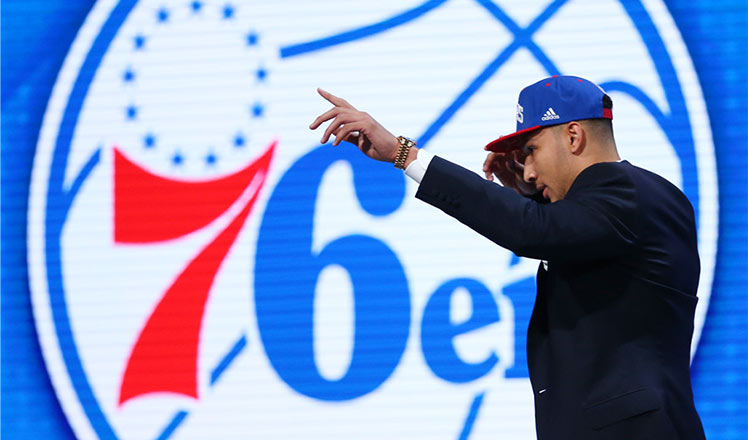
 Aussie Ben Simmons picked by 76ers as No 1 in NBA Draft
Aussie Ben Simmons picked by 76ers as No 1 in NBA Draft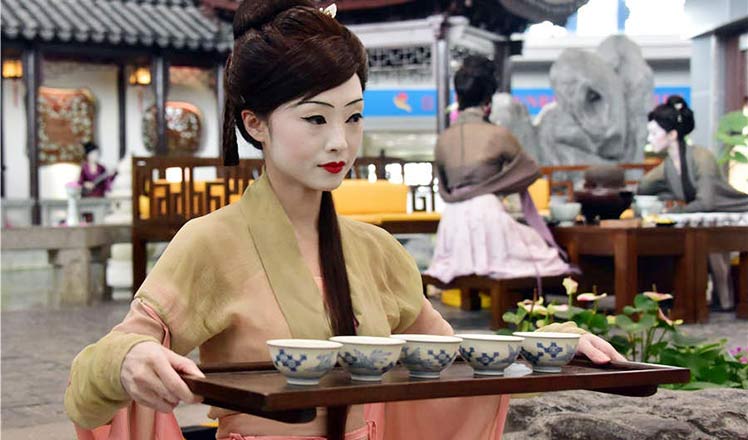
 Ancient scroll's digital art show staged in Beijing airport
Ancient scroll's digital art show staged in Beijing airport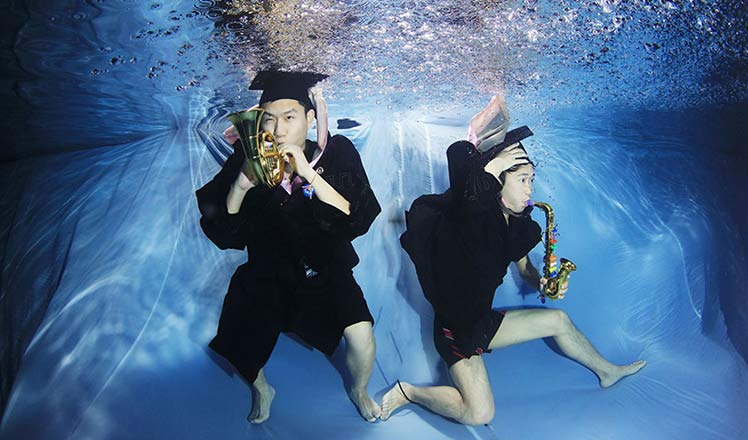
 University students go underwater to celebrate graduation
University students go underwater to celebrate graduation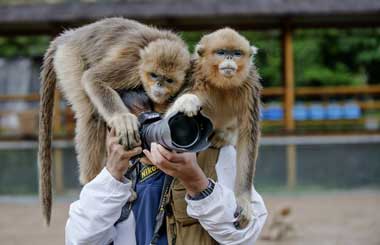
 Ten photos from around China: June 17 - 23
Ten photos from around China: June 17 - 23 Rising above the clouds: Mist envelops Qingdao
Rising above the clouds: Mist envelops Qingdao
 In pictures: Countdown to Brexit referendum
In pictures: Countdown to Brexit referendum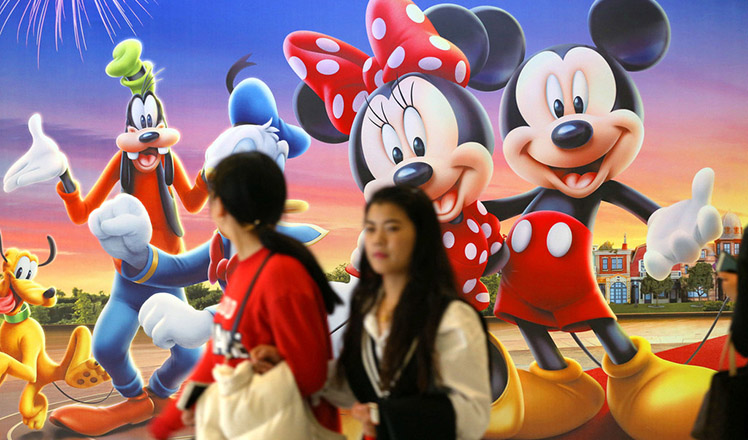
 Top 10 classic Walt Disney animated films
Top 10 classic Walt Disney animated films
Most Viewed
Editor's Picks

|

|

|

|

|

|
Today's Top News
Abe's blame game reveals his policies failing to get results
Ending wildlife trafficking must be policy priority in Asia
Effects of supply-side reform take time to be seen
Chinese State Councilor Yang Jiechi to meet Kerry
Chinese stocks surge on back of MSCI rumors
Liang avoids jail in shooting death
China's finance minister addresses ratings downgrade
Duke alumni visit Chinese Embassy
US Weekly

|

|







